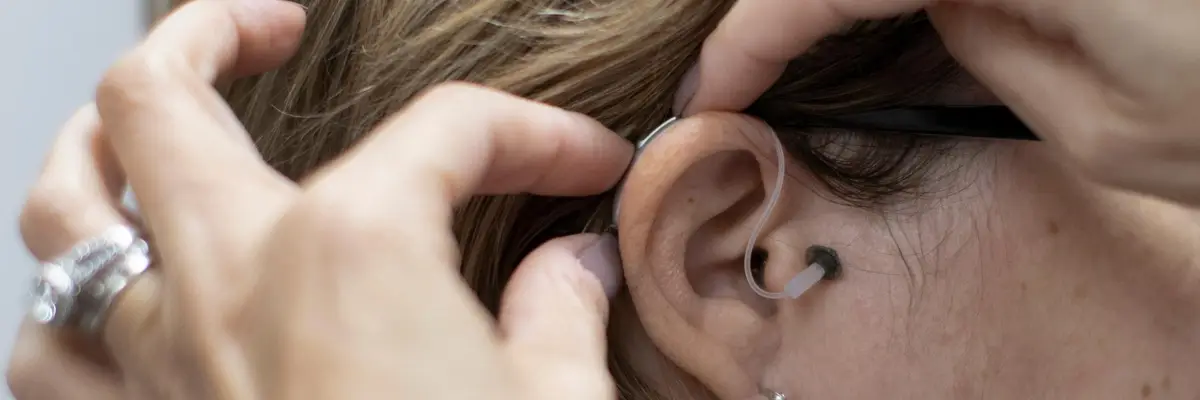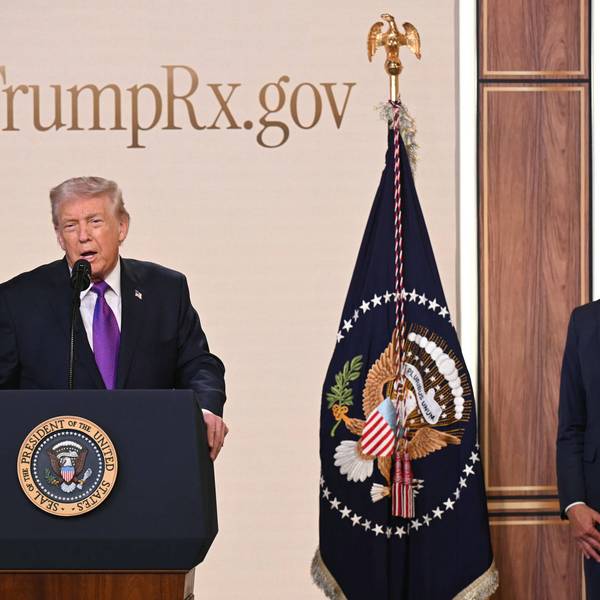
A specialist places a hearing aid on a patient on October 20, 2021 in Fort Lauderdale, Florida. (Photo: Joe Raedle/Getty Images)
'Terrific Win for Consumers': Biden FDA Clears Way for Over-the-Counter Hearing Aids
"This is such an important move that will change lives," said the Congressional Progressive Caucus.
The Food and Drug Administration finalized a rule Tuesday to allow U.S. consumers to purchase hearing aids over the counter beginning as early as October, a years-in-the-making change that could benefit millions of people who have forgone assistance due to onerous regulatory and cost barriers.
"We need to go further by expanding Medicare to cover hearing (and visual and dental)."
"I've been fighting for this for five-plus years and this is a terrific win for consumers," said Sen. Elizabeth Warren (D-Mass.), who teamed up with Sen. Chuck Grassley (R-Iowa) in 2017 to introduce legislation requiring the FDA to allow lower-cost hearing aids to be sold over the counter (OTC) to people with mild to moderate hearing loss.
The bill ultimately passed that same year as part of the FDA Reauthorization Act. The FDA's final rule is set to take effect in 60 days.
In a joint statement on Tuesday, Warren and Grassley said that "we've pressed the FDA to take action every step of the way--holding both Republican and Democratic administrations accountable--and fought back against entrenched special interests."
"We are thrilled that the FDA has finalized these guidelines and that safe, effective, accessible, and affordable hearing aids will now be available over-the-counter for millions of Americans," the senators added.
The Congressional Progressive Caucus also applauded the step:
An estimated 37.5 million adults in the U.S. report some level of hearing difficulty but just a fraction have tried hearing aids, a discrepancy that reform advocates have attributed to costs and other obstacles, including the need for a prescription.
On average, hearing aids cost around $2,000 per device in the U.S.--and most people with hearing problems need an aid for both ears.
Making matters worse, traditional Medicare and many private insurance plans don't cover hearing aids or exams for fitting them, leaving patients to foot the entire bill.
David Segal, a progressive candidate for U.S. Congress in Rhode Island's 2nd Congressional District, applauded the FDA's final rule, saying it would make "life easier and more affordable for more people."
"We need to go further by expanding Medicare to cover hearing (and visual and dental)--and then by expanding Medicare to cover everybody!" Segal added.
During the new rule's public comment period, the FDA faced fierce pushback from the handful of giant hearing aid manufacturers that dominate the market, concentration that has helped push prices higher.
An investigative report released by Warren and Grassley in June found that hearing aid manufacturers such as Starkey used "astroturf lobbying tactics to influence FDA's rulemaking process and weaken the agency's OTC hearing aid rule."
"Almost immediately after FDA issued the proposed rule, stakeholders benefiting from the status quo launched letter-writing campaigns that
generated over 400 comments which--in whole or in part--appeared to be form letters rather than the independent views of those that sent them," the report notes. "These comment letters were ostensibly written by individuals, but in reality reflect industry talking points."
An Urgent Message From Our Co-Founder
Dear Common Dreams reader, The U.S. is on a fast track to authoritarianism like nothing I've ever seen. Meanwhile, corporate news outlets are utterly capitulating to Trump, twisting their coverage to avoid drawing his ire while lining up to stuff cash in his pockets. That's why I believe that Common Dreams is doing the best and most consequential reporting that we've ever done. Our small but mighty team is a progressive reporting powerhouse, covering the news every day that the corporate media never will. Our mission has always been simple: To inform. To inspire. And to ignite change for the common good. Now here's the key piece that I want all our readers to understand: None of this would be possible without your financial support. That's not just some fundraising cliche. It's the absolute and literal truth. We don't accept corporate advertising and never will. We don't have a paywall because we don't think people should be blocked from critical news based on their ability to pay. Everything we do is funded by the donations of readers like you. Will you donate now to help power the nonprofit, independent reporting of Common Dreams? Thank you for being a vital member of our community. Together, we can keep independent journalism alive when it’s needed most. - Craig Brown, Co-founder |
The Food and Drug Administration finalized a rule Tuesday to allow U.S. consumers to purchase hearing aids over the counter beginning as early as October, a years-in-the-making change that could benefit millions of people who have forgone assistance due to onerous regulatory and cost barriers.
"We need to go further by expanding Medicare to cover hearing (and visual and dental)."
"I've been fighting for this for five-plus years and this is a terrific win for consumers," said Sen. Elizabeth Warren (D-Mass.), who teamed up with Sen. Chuck Grassley (R-Iowa) in 2017 to introduce legislation requiring the FDA to allow lower-cost hearing aids to be sold over the counter (OTC) to people with mild to moderate hearing loss.
The bill ultimately passed that same year as part of the FDA Reauthorization Act. The FDA's final rule is set to take effect in 60 days.
In a joint statement on Tuesday, Warren and Grassley said that "we've pressed the FDA to take action every step of the way--holding both Republican and Democratic administrations accountable--and fought back against entrenched special interests."
"We are thrilled that the FDA has finalized these guidelines and that safe, effective, accessible, and affordable hearing aids will now be available over-the-counter for millions of Americans," the senators added.
The Congressional Progressive Caucus also applauded the step:
An estimated 37.5 million adults in the U.S. report some level of hearing difficulty but just a fraction have tried hearing aids, a discrepancy that reform advocates have attributed to costs and other obstacles, including the need for a prescription.
On average, hearing aids cost around $2,000 per device in the U.S.--and most people with hearing problems need an aid for both ears.
Making matters worse, traditional Medicare and many private insurance plans don't cover hearing aids or exams for fitting them, leaving patients to foot the entire bill.
David Segal, a progressive candidate for U.S. Congress in Rhode Island's 2nd Congressional District, applauded the FDA's final rule, saying it would make "life easier and more affordable for more people."
"We need to go further by expanding Medicare to cover hearing (and visual and dental)--and then by expanding Medicare to cover everybody!" Segal added.
During the new rule's public comment period, the FDA faced fierce pushback from the handful of giant hearing aid manufacturers that dominate the market, concentration that has helped push prices higher.
An investigative report released by Warren and Grassley in June found that hearing aid manufacturers such as Starkey used "astroturf lobbying tactics to influence FDA's rulemaking process and weaken the agency's OTC hearing aid rule."
"Almost immediately after FDA issued the proposed rule, stakeholders benefiting from the status quo launched letter-writing campaigns that
generated over 400 comments which--in whole or in part--appeared to be form letters rather than the independent views of those that sent them," the report notes. "These comment letters were ostensibly written by individuals, but in reality reflect industry talking points."
The Food and Drug Administration finalized a rule Tuesday to allow U.S. consumers to purchase hearing aids over the counter beginning as early as October, a years-in-the-making change that could benefit millions of people who have forgone assistance due to onerous regulatory and cost barriers.
"We need to go further by expanding Medicare to cover hearing (and visual and dental)."
"I've been fighting for this for five-plus years and this is a terrific win for consumers," said Sen. Elizabeth Warren (D-Mass.), who teamed up with Sen. Chuck Grassley (R-Iowa) in 2017 to introduce legislation requiring the FDA to allow lower-cost hearing aids to be sold over the counter (OTC) to people with mild to moderate hearing loss.
The bill ultimately passed that same year as part of the FDA Reauthorization Act. The FDA's final rule is set to take effect in 60 days.
In a joint statement on Tuesday, Warren and Grassley said that "we've pressed the FDA to take action every step of the way--holding both Republican and Democratic administrations accountable--and fought back against entrenched special interests."
"We are thrilled that the FDA has finalized these guidelines and that safe, effective, accessible, and affordable hearing aids will now be available over-the-counter for millions of Americans," the senators added.
The Congressional Progressive Caucus also applauded the step:
An estimated 37.5 million adults in the U.S. report some level of hearing difficulty but just a fraction have tried hearing aids, a discrepancy that reform advocates have attributed to costs and other obstacles, including the need for a prescription.
On average, hearing aids cost around $2,000 per device in the U.S.--and most people with hearing problems need an aid for both ears.
Making matters worse, traditional Medicare and many private insurance plans don't cover hearing aids or exams for fitting them, leaving patients to foot the entire bill.
David Segal, a progressive candidate for U.S. Congress in Rhode Island's 2nd Congressional District, applauded the FDA's final rule, saying it would make "life easier and more affordable for more people."
"We need to go further by expanding Medicare to cover hearing (and visual and dental)--and then by expanding Medicare to cover everybody!" Segal added.
During the new rule's public comment period, the FDA faced fierce pushback from the handful of giant hearing aid manufacturers that dominate the market, concentration that has helped push prices higher.
An investigative report released by Warren and Grassley in June found that hearing aid manufacturers such as Starkey used "astroturf lobbying tactics to influence FDA's rulemaking process and weaken the agency's OTC hearing aid rule."
"Almost immediately after FDA issued the proposed rule, stakeholders benefiting from the status quo launched letter-writing campaigns that
generated over 400 comments which--in whole or in part--appeared to be form letters rather than the independent views of those that sent them," the report notes. "These comment letters were ostensibly written by individuals, but in reality reflect industry talking points."

